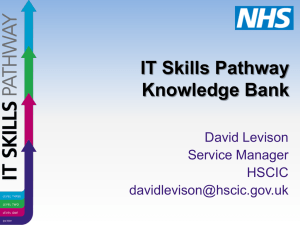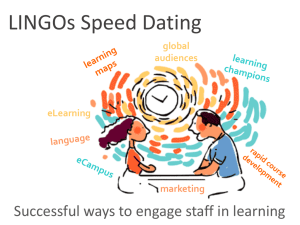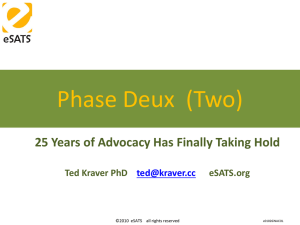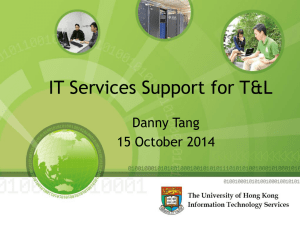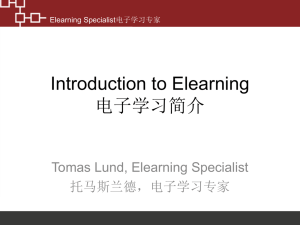Enhancing the Student Learning Experience
advertisement
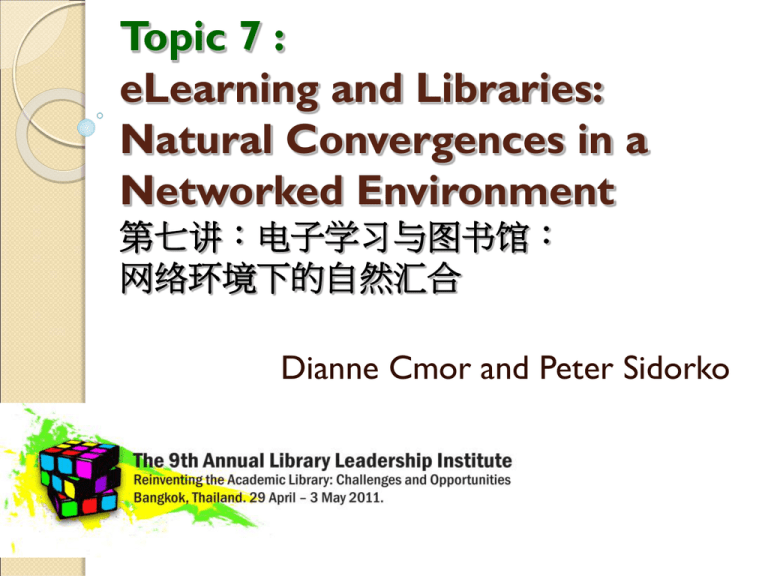
Topic 7 : eLearning and Libraries: Natural Convergences in a Networked Environment 第七讲:电子学习与图书馆: 网络环境下的自然汇合 Dianne Cmor and Peter Sidorko Is it worth the effort? 努力是否有价值? “When it comes to higher teacher and student productivity and a transformation of teaching and learning ... there is little ambiguity. Both must be tagged as failures. Computers have been oversold and underused, at least for now.” 「若提到教师与学生 生产力提升以及教学 转型……情况十分清 晰。两者均须视作失 败。计算机超卖却未 充分利用,至少目前 如是。 Cuban, Larry. Oversold and Underused: Computers in the Classroom. Cambridge, MA: Harvard University Press, 2001, p. 179. But now!! Why bother with elearning? 何需电子学习? Student expectations Enhanced experience (“rich and diverse”) Enhanced curricula Media rich T/L environment Increasing availability of networked resources Flexibility - time and place and methodology 学生的期望 强化了的经验 (「丰富多样」) 改良了的课程 多元媒体教学环境 网络资源可查阅性增加 灵活性──时间、地点 与方法 Why bother with elearning? 何需电子学习? Collaboration and interactivity - local and global Assessment Expression Media rich resources Students with certain disability. 合作与相互影响── 本地性与全球性 评估 表达 多媒体资源 有一定程度残障的学 生 Threats/Concerns 危机与忧虑 (Rapidly) Evolving technologies Competencies: teacher and learner Unrealistic expectations: teacher and learner Context counts: law vs engineering Mixed technologies, eg hardware Resourcing 科技(迅速地)演变 反应能力:教学人员与 学习者 不现实的期望:教学人 员与学习者 考虑内容:法律与工程 混合科技,例如:硬件 搜寻资源 Opportunities 机会 An institutional elearning strategy? 机构的电子学习 策略? An appropriate technology enabled environment 合适的科技化环 境 Why an e-learning strategy? 为何要有电子学习策略? For improved learning and teaching outcomes For organisational direction For consistency To focus resources: ◦ Infrastructure ◦ Support ◦ Staff and student development 为了提升教学成果 配合机构方向 一致性 着重资源: ◦ 基础设施 ◦ 支援 ◦ 员工与学生的发展 E-learning Strategy 电子学习策略 1. 2. 3. 4. 5. Vision and strategy Student learning Staff development Infrastructure and equipment Management and monitoring 1. 愿景与策略 2. 学生学习 3. 员工发展 4. 基础设施与设备 5. 管理与监察 1 Vision and Strategy 愿景与策略 Clarity 具明确性 Communicated 可沟通的 Embedded institutionally, including in the library’s strategies 能融入机构内 包括图书馆的 各种策略 HKU Strategic Theme 1/港大策略主题一: Enhancing the Student Learning Experience 提升学生的学习经历 “… provide a 21st Century learning environment to support the development of innovative pedagogies, especially those incorporating the use of technology-supported and student-centred learning.” “…将提供一个融 合廿一世纪教学需 要的学习环境,支 持创新教学法的发 展,尤其是结合科 技辅助及以学生为 中心的教学法.” http://www3.hku.hk/strategic-development/eng/strategic-themes-for-09-14/enhancingthe-student-learning-experience.php HKU Operational Priority 实施重点 “through providing a virtual learning environment that complements and enhances the experiential and faceto-face modes of learning, we will provide a richer and more diverse learning experience for our students” 「透过建立虚拟的学 习环境,补足并改进 体验式及面对面的教 学方式,为学生提供 更丰富多元的学习体 验」 http://www3.hku.hk/strategic-development/eng/strategic-themes-for-09-14/enhancing-thestudent-learning-experience.php#operational-priorities 2 Student Learning 学生学习 Electronic resource availability ◦ Content – library resources and more ◦ Software ◦ Hardware Widespread use of technology including email and VLEs Skill assessment and development Continued, accessible technical support 可使用的电子资源 ◦ 内容 ──图书馆 或其他資源 ◦ 软件 ◦ 硬件 广泛使用的科技,包 括电邮及虚拟学习环 境 技能评估及发展 暨持续又可及的技术 支援 3 Staff development 员工发展 Skills needs assessment 需评估的技能 Motivation 激励因子 Targeted staff development and training 有目标的员工发展和 培训 ◦ Platforms ◦ 各种平台 ◦ Discipline and pedagogically based ◦ 以学科及教学法为 基础 Continued technical support 持续的技术支援 Dedicated T/L technologists 热心教学的技术人员 4 Infrastructure and Equipment 基础设施与设备 Appropriate hardware and software deployed 适当部署软硬件 IT standards adopted 采纳信息科技标准 Decentralised systems suitably coordinated 适当协调分散系统 天衣无缝的连接 Seamless connectivity Learning platforms 学习平台 On demand technical support 按需要提供技术支援 Enhanced Physical Environment 改良实质环境 Evolving learning spaces ◦ Classrooms ◦ Learning commons ◦ Libraries Variety of learning styles Flexibility Technology enabled Service support etc 不断发展的学习空间 ◦ 课室 ◦ 学习共享中心 ◦ 图书馆 多元化学习模式 灵活性 科技化 服务支援 等等 5 Management and Monitoring 管理与监察 Evaluation framework 架构评估 Motivation for enhancement 激励向上的因素 Structured management model 结构化管理模式 But, some necessary fundamentals (or, conditions of success) 然而,一些原則是不可或缺的 (或者說是成功的條件) Sound educational objectives are the basis Leadership exists Commitment can be developed and is supported Collaboration is fostered Resources are allocated Time is needed, much time Evaluation and modification are fulfilled 以正确的教育目标为 原则 领导技能可发挥作用 承诺需有发展空间而 且获得支持 合作得到鼓励 资源获分派 时间必不可少,有充 裕的时间 可实行评估与改良 eLearning & Libraries 电子学习与图书馆 better opportunities for library resources & services to support learning Point of need, anticipatory, responsive eLearning platforms allow INTEGRATED library support (vs parallel support) 为图书馆资源和服务 提供更大发展空间以 支援学习 资源可按需要传送至 用户,可预知需要并 作出迅速反应 电子学习平台容许整 合的图书馆支援(而不 是并列性支援) Sample Course Integrating Resources 整合资源 Linking 链接 Links, links and more links – when and where relevant Entire reading/resource lists Individual links for specific weeks/topics RSS feeds, alerts, etc. Course reserves in eLearning platform 链接、链接、越来越多 的链接──于相关时与 相关处出现 全篇文献与资源目录 因特定周别或主题而收 集的相关链接 RSS feeds, alerts,等等 电子学习平台的指定教 科书 Integrating Resources 整合资源 Beyond Text 超越文本 Link to or embed multimedia Open access, commercial and local YouTube, music databases, podcasts, HKBUtube! 连接或融入多媒体 开放存取,商业性质 或机构性质的 YouTube,音乐资料库, 播客, HKBUtube! Be careful! Do you have the right to embed or only to link?? Integrating Resources 整合资源 Toolkits, Widgets, etc. 工具套件、小工具等等 Customizable toolkits 客制化工具套件 Widgets and toolbars 小工具及工具栏 Include services as well as resources 包括服务与资源 Relevance, visibility & recommended by course instructor (not “just” librarian) 相关性、可见度、 获课程导师推荐 (并非「仅」由图 书馆员推荐) PolyU Library (HK) Integrating Services 整合服務 Tutorials / Learning Objects 教學 / 學習元件 Full tutorials – generic or course specific Short, modular, re-usable learning objects Flash, screencasts, videocaptures; or simple pdf/ppt Insert directly into course environment when/where most useful 全面教学──普通或课 程指定的 短期的、模组形式的 、再用的学习元件 Flash、 屏幕录像、视 频捕获软件,或简单 的 pdf 或ppt 在最适用时及最适用 处直接加进课程环境 Integrating Services 整合服務 Embedded Librarians 嵌入式館員 Trust and collaboration of instructors Monitoring course regularly, or limited time period (tied to assignment due date) 教师的信任与合作 定期或于限定时间内 监察课程(配合交作业 日期) 实时服务──聊天室、 免费网络电话、 「 第二人生」 运用电子学习平台工 具── 论坛、聊天室 、自我评量工具等等 Live assistance – Chat, Skype, Second Life Use of eLearning platform tools – discussion forum, chat, quiz, etc. Other considerations 其他原因 Mobile eLearning – what resources & services most useful? 流动电子学习── 哪些资源与务服最 有用? Web 2.0 – engaging students in learning Web 2.0── 学生 可参与学习 ePortfolios – research products/journals ePortfolios –研究 成果或期刊 Final Thoughts 结语 Avoid overload of resources only 避免沦为资源超载 Provide guidance and context on how to think about information 提供如何判断信息 的指引和范围 “Teleport” the teaching role of the reference desk into your eLearning environment - this is not outdated! 咨询柜台的教学角 色「瞬间移动」至 你的电子学习环境 ── 这并非过时! Exercise: Developing & Supporting eLearning Thinking about your own institution, what opportunities and challenges face the library in developing/supporting elearning? Some possible considerations: Is there an institutional strategy? Does the Library have a role in it? What strengths/weaknesses exist at your institution in developing/supporting eLearning? (commitment level, physical resources, computing resources, human resources & expertise) What strengths/weaknesses exist at your library in developing/supporting eLearning? (same as above!) What could you offer TODAY to support eLearning at your institution? What could you offer one year from now? References 参考文献 Cuban, L. (2001) Oversold and Underused: Computers in the Classroom. Cambridge, MA: Harvard University Press. Developing an elearning strategy: BECTA Matrix http://designing.flexiblelearning.net.au/tours/documents/becta_matrix.pdf Duke, J, Jordan, A & Powell, B. (2008) A study for the JISC into the integration of technology into institutional strategies, http://www.jisc.ac.uk/publications/reports/2008/strategicdevelopmentfinalreport.aspx Kelly, B. Approaches To E-Learning: Developing An E-Learning Strategy http://www.ukoln.ac.uk/web-focus/events/workshops/trieste-2004/trieste-strategy.ppt Quality Assurance Council (2009) Report of a Quality Audit of the University of Hong Kong, http://www.ugc.edu.hk/eng/qac/publication/report/hku200911e.pdf Salmon, G (2005) Flying not flapping: a strategic framework for e-learning and pedagogical innovation in higher education institutions, ALT-J: Research in Learning Technology, 13(3), 201 – 218. The University of Hong Kong (2009), Strategic Development 2009-2014, http://www3.hku.hk/strategic-development/eng/ University of Kent e-learning Strategy 2007, http://www.kent.ac.uk/elearning/strategy.html Wills, S, Strategic Planning for Blended eLearning, in Proceedings of the 7th International Conference on Information Technology Based Higher Education & Training, Sydney, July 2006. http://ro.uow.edu.au/cgi/viewcontent.cgi?article=1033&context=asdpapers
